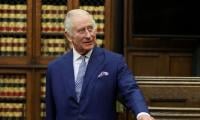ISLAMABAD: The Supreme Court (SC) on Wednesday conditionally suspended its judgment delivered on October 23, declaring the trial of 103 civilians in military courts unconstitutional.
A six-member larger bench of the apex court, headed by Justice Sardar Tariq Masood, conditionally suspended its judgment of Oct 23 by a majority 5-1 with Justice Musarrat Hilali dissenting. Other members of the bench included Justice Aminuddin Khan, Justice Muhammad Ali Mazhar, Justice Syed Hassan Azhar Rizvi, Justice Musarrat Hilali and Justice Irfan Saadat Khan.
The larger bench was conducting a preliminary hearing on the intra-court appeals (ICAs), filed against its judgment of October 23. The federal caretaker government, Ministry of Defence and governments of Punjab, Khyber-Pakhtunkhwa (KP) and Balochistan had filed the ICAs under Section 5 of the Supreme Court (Practice and Procedure) Act, 2023, read with Article 184(3) of the Constitution against the order, passed by the apex court in the petitions, challenging the trial of civilians in military courts.
During the hearing of the ICAs, Attorney General for Pakistan (AGP) Mansoor Usman Awan requested the court to conditionally allow the trial of 103 civilians in military courts. The court reserved the verdict on the plea of AGP and later on announced it, conditionally suspending its October 23 judgment, holding that the trials of 103 civilians in military courts would continue, but the decision of the trials of May 9 suspects would be subject to the final orders of the apex court order on the intra court appeals. The court issued notices to the respondents and adjourned the hearing on intra-court appeals until the third week of January.
On October 23 the Supreme Court declared the trial of civilians in military courts as unconstitutional and held that 103 persons and others, who may be placed concerning the events arising from May 9-10 could be tried by criminal courts, established under the ordinary or special law of the land.
Earlier, when the six-member bench resumed hearing on the ICAs, the court was informed that former chief justice Jawad S Khwaja, who was one of the petitioners, challenging the trial of civilians in military courts, had filed an application seeking recusal of Justice Sardar Tariq Masood from the instant bench hearing the ICAs. Aitzaz Ahsan and others also objected to Justice Sardar Tariq hearing the ICAs.
Justice Sardar Tariq Masood, however, said they would first hear from the federation, and called AGP Mansoor Usman to the rostrum. At this, counsel for the petitioners including Barrister Latif Khosa, Salman Akram Raja as well and the petitioner Aitzaz Ahsan came to the rostrum. Aitzaz told the court that one of the petitioners had sought the recusal of Justice Sardar Tariq Masood from the bench, adding that the court should first decide on that application.
Justice Sardar Tariq, however, said the court would first hear the intra-court appeals and issue notices in that regard. Aitzaz Ahsan, however, contended that when an application for recusal was filed, it should be decided first. Latif Khosa, who is counsel for Aitzaz Ahsan, reminded Justice Sardar Tariq that he had declared petitions, challenging the trial of civilians in military court as non-maintainable, then how could he hear these ICAs.
Justice Sardar Tariq asked who had applied for his recusal. Salman Akram Raja, counsel for one of the petitioners, replied that Jawad S Khwaja had filed an application, seeking his recusal. Justice Sardar Tariq reminded the counsel that Justice Jawad S Khawaja had himself held in a case that it was the prerogative of a judge either to remain on the bench or recuse. Latif Khosa submitted that Justice Sardar Tariq Masood had given his opinion in the petitions, challenging the trial of civilians in military courts, declaring the petitions non-maintainable. Justice Tariq Masood, however, refused to recuse himself from the bench. “I will not recuse myself from the bench, what can you do,” Justice Masood asked.
Meanwhile, Attorney General Mansoor Usman contended that the objections raised by the parties had no worth, adding that if the person who had sought recusal of the judge from the bench was not present in the courtroom, then how his application could be entertained. The AGP requested the court to hear the ICAs on merit. Latif Khosa told Justice Tariq Masood that he was hearing the instant ICAs despite the objections raised on his presence on the bench.
However, the AGP took the stance that an objection could be heard when notice had not been issued in the instant matter. Justice Sardar Tariq asked the AGP to commence his arguments, but he stated that Khawaja Haris, counsel for the defence ministry, would first argue on the ICAs.
Khawaja Haris submitted that the impugned judgment, passed by the apex court on October 23, did not mention as to which articles of the Constitution and provisions of the Army Act were declared unconstitutional. In this respect, the counsel cited the case of Brigadier (retd) F.B. Ali and submitted that the Army Act’s sections were upheld and a 17-member full court had also declared the judgement as correct while hearing a case on the 21st Amendment. He further submitted that the Supreme Court had previously ruled that when an offence pertaining to the military is committed, then the trial could be held in a military court.
Justice Muhammad Ali Mazhar asked the counsel whether he would ensure that a ‘fair trial’ was held in military courts. Khawaja Haris referred to the trial of Indian spy Kulbushan Yadav. He contended that the jurisdiction of the Army Act over civilians was already limited; hence submitted that provisions related to civilians could not be declared void.
Justice Sardar Tariq Masood observed that a detailed verdict on military trials of civilians was not yet issued. “Whether we should announce the verdict on the ICAs without waiting for the detailed verdict,” Justice Sardar Tariq asked the counsel.
Justice Irfan Saadat Khan, another member of the bench, asked the counsel for the Ministry of Defence whether they should not wait for the detailed judgment. “I would then request the court to grant permission for resumption of military trials of those who are already in the military custody,” Khwaja Haris replied, adding that the military courts were not conducting trials of every civilian, but would try those who were dangerous for the national security. Khwaja Haris submitted that 103 persons were in military custody for seven months; therefore, he contended that it would be appropriate that their trials should be completed. The court also issued notices to the respondents in intra-court appeals (ICAs) and adjourned the hearing until the third week of January.
Meanwhile, a Pakistan Tehreek-e-Insaf (PTI) spokesperson strongly criticised the SC verdict of suspending its October-23 verdict, barring military trial of civilians, and called it a ‘judicial coup’ against the Constitution, and an attack on basic human rights in the country. In a strongly-worded reaction to the decision of the six-member bench of the top court, the spokesperson made it clear that there was no precedent of a trial of civilians in the military courts in a civilised democratic society of the world.
He pointed out that there was no scope for trials in military courts of civilians even in our Constitution and recalled that the bench consisting of senior judges of the apex court had explained the Constitution and the law through an appropriate verdict and saved the country from a major constitutional accident.
An esteemed member of the six-member bench, he noted, also disagreed with Wednesday’s decision, adding that the strong reaction of lawyers and legal experts to the six-member bench’s controversial decision clearly reflected the widespread concerns and anxiety in the entire nation.
Separately, the Central Information Secretary of Istehkam-e-Pakistan Party (IPP) Dr Firdous Ashiq Awan appreciated the Supreme Court’s decision to allow a trial of attackers of military installations in military courts. “It is an excellent decision. It made the country’s defence walls stronger, and more stable.
“After this decision, anti-national elements and terrorists hiding in the guise of civilians have been exposed,” she said adding that the time had come to deal with an iron hand those responsible for creating chaos and unrest in the country.
She said the Supreme Court gave a decision in accordance with the public aspirations and expectations of the nation. With this decision, the hopes of the enemies of the country and those who spread unrest would dash to the ground, she added.
Riyadh announced on August 15, 2021 that it had withdrawn its diplomats from Afghan capital
South Africa had their target reduced by one run to 308 via Duckworth–Lewis–Stern method
Putin was addressing local leader of Tatarstan region where Kazan is located in road-opening ceremony
India is home to more than 220 million child brides, according to United Nations
Sindh CM underscores appointment of dedicated Ombudsperson to safeguard rights and interests of working women in Sindh
Students under age of 22 with domicile of Punjab will be eligible for Honhar Scholarship







